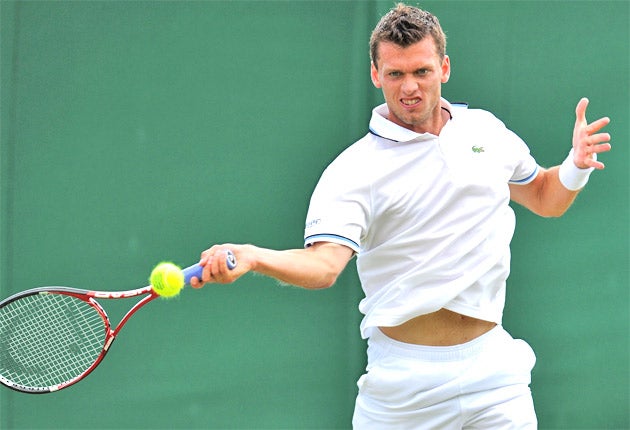Murray looks to McIlroy example as Kamke turns to past champion

Your support helps us to tell the story
From reproductive rights to climate change to Big Tech, The Independent is on the ground when the story is developing. Whether it's investigating the financials of Elon Musk's pro-Trump PAC or producing our latest documentary, 'The A Word', which shines a light on the American women fighting for reproductive rights, we know how important it is to parse out the facts from the messaging.
At such a critical moment in US history, we need reporters on the ground. Your donation allows us to keep sending journalists to speak to both sides of the story.
The Independent is trusted by Americans across the entire political spectrum. And unlike many other quality news outlets, we choose not to lock Americans out of our reporting and analysis with paywalls. We believe quality journalism should be available to everyone, paid for by those who can afford it.
Your support makes all the difference.His membership of the All England Club might be in jeopardy after this. Michael Stich, who won the men's singles title here 20 years ago and has reinforced his credentials among the British tennis establishment as a stalwart of the BBC commentary team, is the mentor of Tobias Kamke, who will today attempt to end Andy Murray's quest to win the Wimbledon title.
Kamke, who secured his place in the second round by completing a 6-3, 7-6, 5-7, 6-1 victory yesterday over Slovenia's Blaz Kavcic, has looked to Stich for advice ever since he first met his boyhood hero eight years ago at the Uhlenhorster HC club five minutes from the 1991 Wimbledon champion's home near Hamburg. Kamke, who was 17 at the time, clearly impressed his fellow German by beating him in a practice match.
When Kamke enjoyed his first success on the Futures circuit one year later he wanted to give up his academic studies, but Stich was among those who persuaded him to wait. "If you're good enough to make it on tour right now then you're going to make it in two years' time," Stich told him.
The two men met on Monday and Kamke said he would be speaking to Stich last night to ask for advice on playing in such of a big crowd. Kamke, now 25, first came to Wimbledon as an 11-year-old spectator with his father to watch Boris Becker play, though he has never set foot on Centre Court.
With career earnings of $528,079 (about £325,000), Kamke has pocketed barely a thirtieth of the prize money Murray has won. The cars they drive are evidence of their different lifestyles: Murray recently swapped his Ferrari for an Aston Martin, while Kamke still drives the Volkswagen Golf he bought seven years ago.
Roger Federer was among those who congratulated Kamke after he was presented with an award in London last November as the ATP World Tour's "Newcomer of the Year" after climbing 187 places in the world rankings. He was at a career-high No 64 earlier this year though he has since slipped to No 83. Murray remembers practising with Kamke in Monte Carlo but otherwise has seen little of him.
As if the weight of national expectation on his shoulders was not great enough, Murray has been reminded this week of the bar that the golfer Rory McIlroy set with his remarkable victory in the US Open, which has made him favourite to win the BBC's Sports Personality of the Year award. Murray said with a smile: "A few people have said to me that because of what Rory has done, unless I win this week I have got no chance."
While McIlroy played four rounds at Congressional to win his first major on Sunday night, Murray will have to play seven to take his first Grand Slam title here. Round one was safely negotiated with a 4-6, 6-3, 6-0, 6-0 victory over Spain's Daniel Gimeno-Traver under the Centre Court roof on Monday.
"I've never met Rory but I would like to," Murray said. "I've always found it interesting meeting other athletes – ones who have been very successful and especially British athletes. They have been through a lot of the same sort of things that you have."
He added: "I do play golf from time to time, but when I play my back gets quite stiff so I never play around competitions. But after here I have got four or five weeks until the next tournament so I will play a little bit.
"Everyone thinks I'm a bandit because I always give myself 15 or 16 shots. I've not lost a game of golf for five years. But it's not me being a bandit. So many people who I play with say: 'I'm a seven.' But I've never seen them play to a seven handicap ever. I would rather just say I'm a 15 and that is your genuine handicap rather than some macho thing like I have to be single digits. Hardly anyone is."
As for comparing golf and tennis Murray said: "They're both individual sports but in golf you have a caddy with you who is there to help you with things. Tennis is all about variation, while golf is about repetition. You have to do the same swing over and over and over again. That's what's impressive about it. One little slip-up in the swing or one wrong movement and they can hit the ball into the trees."
Join our commenting forum
Join thought-provoking conversations, follow other Independent readers and see their replies
Comments